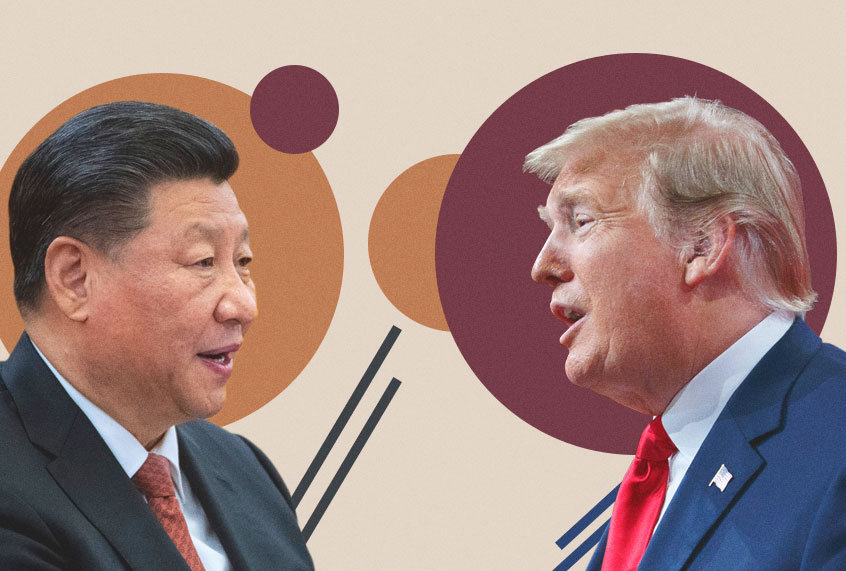Candidate Donald Trump railed against America’s chronic trade deficits, vowing to eliminate them if he became president.
So, how’s Trump doing? Awful. Trade deficits are growing on his watch.
The overall trade deficit in September was 21% larger than during his first full month in office.
In 2016, under President Barak Obama, America imported $502.9 billion more in goods and services than it sold in exports.
In 2018, under Trump, that ballooned to $627.7 billion, an increase of $124.7 billion, and the deficit is on pace to run even deeper in 2019. Folr the nine months ending in September, the overall trade deficit was $481.3 billion, up $24.8 billion for the same period of 2018.
Trump always rails about the trade in goods, ignoring services such as accounting, banking and insurance.
Our deficit in goods traded with China grew through last year. Indeed, the 2018 deficit of $419.5 billion was the largest on record, up a whopping 21% over the $346.8 billion of Obama’s last calendar year as president. So far, 2019 looks like it will come in around $360 billion.
The deficit with China is smaller not because Trump’s policies haven’t so much altered the balance of trade as shrunk the volume of trade. That, in turn, means fewer jobs for Americans, close to 11 million of whom, the Commerce Department estimates, owe their jobs to trade with China.
Mexico, Too
And what of Mexico, another Trump trade bugaboo? In 2016, Obama’s last year, our trade deficit in goods was $63.3 billion. That rose to $80.7 billion in 2018. That’s a 27% increase under Trump.
In just the first nine months of this year, our Mexico goods deficit was $76.1 billion, meaning this year will easily set a new record deficit.
Trump’s disregard for trade in services is a most curious omission for a man who boasts, falsely, that he has an economics degree from Penn’s famous Wharton School of Finance. His degree, for which he mostly did independent studies while working for his father, is from a one-professor real estate department at Penn that was under Wharton, which is a graduate school.
Equally troubling is Trump’s mistaken belief that China and Mexico pay the tariffs he has placed on their goods.
Trump’s tariffs are not paid by China. Tariffs are a tax on Americans, paid by companies who import goods and then either passed on to consumers or absorbed as reduced profits. The Treasury Department, by the way, calls them “customs duties.”
Americans pay the price
Trump’s tariffs cost Americans $71 billion in the first nine months of the calendar year.
So far, Trump has spent $28 billion of your tax money in bailout money for soybean and other Midwest farmers whose major market he decimated with his anti-China trade policies. The damage may last years or decades because China switched to other countries for soybeans, promising to buy up to $50 billion a year from Brazil. Think of that as a Trump “Put Brazilian Farmers First” policy.
During a Sept. 4 news conference on Hurricane Dorian, the one that he falsely said would hit Alabama, Trump veered off into China trade with assertions that were just as false:
“We have a lot of—we’ve taken in tens of billions of dollars in tariffs from China. Prices have not gone up, or they’ve gone up very little. China has paid for most of that, and I say paid for all of it. China has now had the worst year that they’ve had in 57 years. This is the worst year they’ve had in 57 years. And they want to make a deal; we’ll see what happens.”
That was such nonsense that anyone who knows their Chinese history laughed. In 1962 China was a poor farm country with minimal industry. It was still under Mao, whose policies resulted in mass starvation that some historians estimate at 45 million people dying.
What is fact is that the spectacular growth of the Chinese economy has slowed to its lowest level in the last three decades.
Tariffs wipe out income tax cuts
The Trump tariffs pretty much wipe out the modest income tax savings that went to the bottom 90% of Americans under the Trump/Radical Republican tax cut law enacted in December 2017. Most of its savings went to corporations and the top 1%.
So, while Trump has tricked millions of Americans into believing he cut their tax burdens, he has actually raised their total burden with his tariffs.
Trump’s tariffs are also slowing economic growth and in time will mean 512,000 fewer jobs than if the tariffs had never been imposed, Tax Foundation has noted.
Analysis by Trade Partnership, a consulting firm, asserted that the “biggest winners from tariffs on Chinese cell phones are other foreign producers. Manufacturers in Korea and Vietnam would see annual export revenues grow by about $1.8 billion and $1.2 billion, respectively. American consumers, on the other hand, would pay over $8.1 billion more for cell phones.”
Prices of laptops, video games and toy drones are also expected to rise significantly, costing American consumers billions more for those who do buy. The study predicted a 35% drop in laptop purchases.
Because there is virtually no laptop manufacturing in the United States, “American consumers would pay $785 in new out of pocket expenses for each $1 in new revenue for American manufacturers,” Trade Partnership estimated.
Remember that as an example of Trump’s ignorance of trade benefits.


